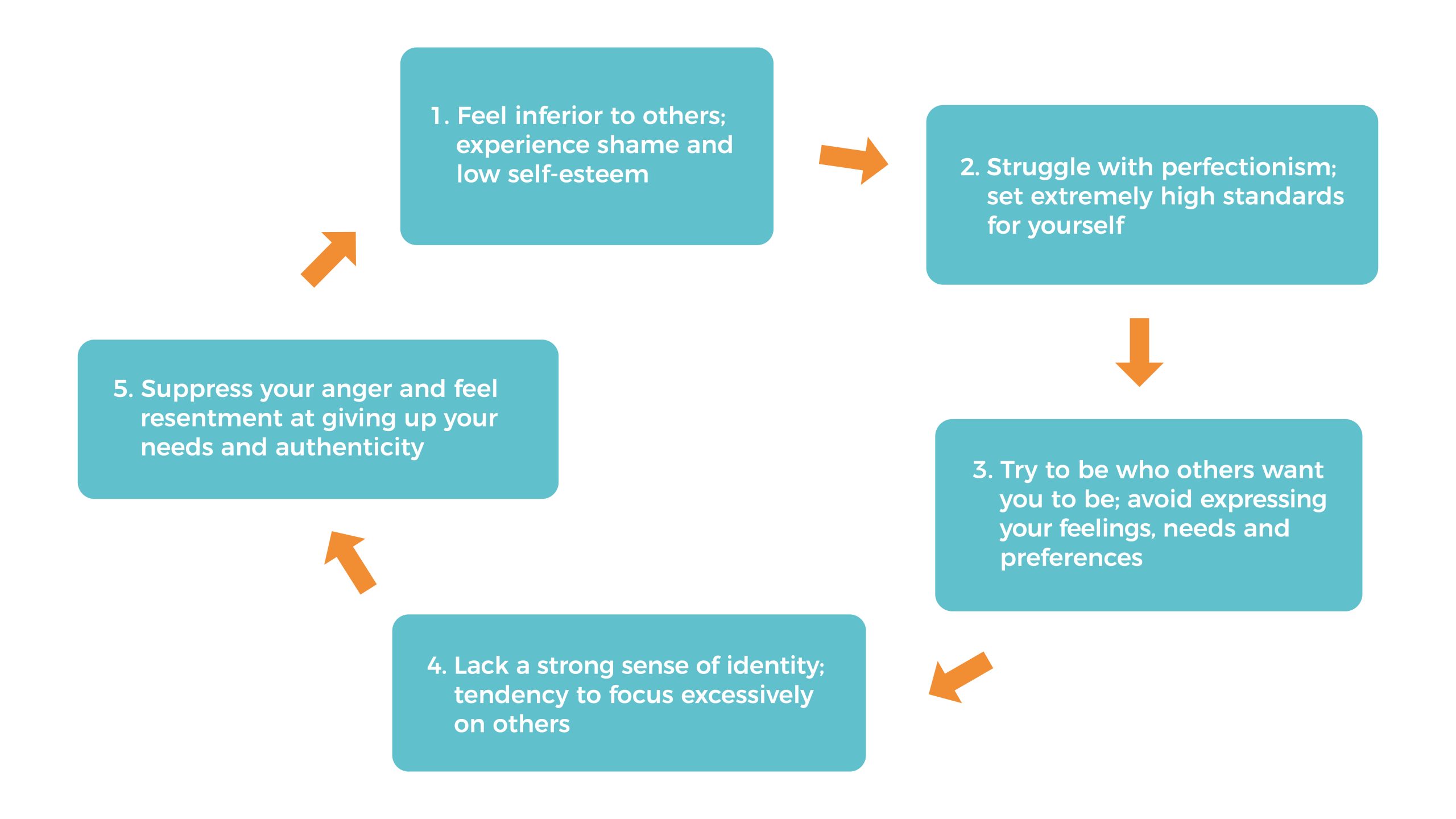“Sometimes people become depressed even though they have not recently experienced any actual major loss, but in the course of therapy it may turn out that they have never felt loved or wanted by their parents or partners, and are in a kind of grieving-yearning state for the closeness they lack.” – Dr Paul Gilbert
Poor parenting styles are associated with poor mental wellbeing. Suboptimal parenting leads you to develop certain core beliefs about yourself, others and the world around you. In particular, your relationships and sense of safety are negatively affected.
Research has clearly demonstrated that people who experience parental love and affection develop a well-functioning soothing system. In other words, they’re biologically well-equipped to handle distress.
On the other hand, experiencing parental coldness and hostility can lead people to develop what psychologists call a high level of stress reactivity. If you’ve experienced poor parenting, you may go through life feeling as though your stress response is out of proportion to the situation.
This is because you may:
- Have a stronger sympathetic nervous system reaction
- Release more stress hormones
- Experience higher blood pressure
- Have a higher heart rate during your stress response
So, what exactly is classified as “poor parenting”?
Note: Sometimes parents don’t fit neatly into one category, so you may have experienced more than one poor parenting style.
- Affectionless-Control Parenting
- Lack of warmth and care
- Overcontrolling
- Impose high standards of achievement
- Intrusive
- Critical
- Low frustration tolerance - prone to angry outbursts
- Child experiences fear and anger towards the parent
- Enmeshment and Boundary-Violating Parenting
- Fails to recognise a child's own individuality and tries to control their lives
- Places adult responsibilities onto child such as looking after a younger sibling
- Shares information that is not age-appropriate for the child, such as relationship problems
- Child may feel a responsibility to “rescue” parents
- Child feels a sense of burden and guilt
- Unpredictable Parenting
- Loving one minute and distant the next
- May be verbally and/or physically abusive
- Child loves but also fears the parent
- Unreliable Parenting
- What they say and do differs – they may talk about being loving, but don’t always act that way
- Child perceives parents as unavailable for reliable protection and support
How Poor Parenting Affects Your Relationships
Poor parenting is associated with what psychologists call insecure attachment styles. Having an insecure attachment style can make it more challenging to develop and sustain healthy long-term relationships, which is a key determinant of good mental health.
There are two main types of insecure attachment:
- Anxious attachment
- Avoidant attachment
Signs of Anxious Attachment
- Uncomfortable being single
- Crave constant reassurance and affection
- Prone to obsessing over relationships
- Prone to falling in love quickly
- Forgo own needs in order to please others
- Lack strong sense of identity due to excessive focus on others
- Hypersensitive to criticism and signs of withdrawal
- Fears rejection and abandonment
- Prone to worrying their partner doesn’t like them enough
- Distrusting
- Prone to jealousy and anger
- Experience chronic doubts about self-worth
- May be manipulative in order to gain attention and care
- Highly uncomfortable with uncertainty
- Difficulty managing intense emotions
Signs of Avoidant Attachment
- Strives for independence and self-sufficiency
- Uncomfortable with closeness; feels “suffocated” by intimacy
- Keeps an emotional distance from others
- Rarely turns to others to ask for help
- Less likely to share what they feel deep down
- Distrusting
- Prefers to work alone
- May use work to avoid meaningful relationships
- Casual sex may feel easier than intimate sex
- Prone to focusing on other people’s flaws
- May lack insight into personal weaknesses because acknowledging them makes them feel less self-sufficient
- Avoids dealing with relationship conflict
- Can be oblivious to genuine signs of caring and emotional availability
- Prone to suppressing emotions
Perhaps you relate to both anxious and avoidant characteristics. If so, you may have the fearful avoidant attachment style.
These styles of relating to others can be seen in relationships with partners, friends, and colleagues. It’s possible to exhibit one attachment style predominantly in one area and another in a different area.
Interestingly, research suggests that women are more likely to be anxiously attached, whereas men are more likely to be avoidantly attached. This may be due to the role toxic masculinity plays in society, with men experiencing more social pressure to suppress their emotions than women do.
The Anxious-Avoidant Relationship Trap
Anxious-avoidant relationships are very common, and they tend to be very difficult for both parties involved.
This may be because the anxiously attached person is more likely to persist in their attempts to develop a relationship with an avoidantly attached person, whereas a securely attached person would be more likely to move on.
Research shows that the most effective way to reduce an insecure attachment style is simple: Enter a long-term relationship with a securely attached person.
Signs of Secure Attachment
- Comfortable with closeness
- Trusting
- Strives to resolve relationship conflicts
- Comfortable sharing feelings with partners and friends
- See themselves as worthy of love
- Don’t worry about being abandoned
- Seeks out social support
Poor Parenting and The Subordinate Approval Trap
Another way poor parenting affects your relationships is through what Dr Paul Gilbert calls The Subordinate Approval Trap.
Whilst everyone seeks approval to a certain extent, it tends to be particularly pronounced in people with poor mental wellbeing. Poor parenting styles and traumatic experiences such as bullying are strongly associated with the emotion of shame. To cope with shame (consciously or unconsciously), you may adapt yourself and your behaviour to please others and gain their approval.
This leads to the vicious cycle shown below:

It’s your parent’s duty to instil you with a sense of unconditional love and acceptance, a sense of your own ‘basic goodness’.
If you received inadequate love and affection from your caregivers, it can lead to the above cycle and the feeling that author William Moyers describes as a ‘hole in the soul’. Some people describe it as a persistent sense of emptiness.
Perhaps you’ve labelled yourself as having the ‘Type A personality’. You’re driven, ambitious and achievement-oriented, and it’s helped you do well in academics and your career. We’d encourage you to consider how much these tendencies could be understood through perfectionism and The Subordinate Approval Trap.
If you relate to this, it's worth considering: How much is this cycle taking its toll on your health and wellbeing? How does it affect your relationships with others? Is it worth it?
If you want hijack this vicious cycle, over time, you can. If this resonated with you, we encourage you to check out our free eBook Understanding and Healing Trauma.
Trauma-Informed Self-Guided Support for Mental Health
Research shows that self-help materials are often enough for people to overcome mild to moderate mental health difficulties without professional support.
If you’re interested in a trauma-informed self-guided program, be sure to check out The Mental Wellbeing Toolkit.




